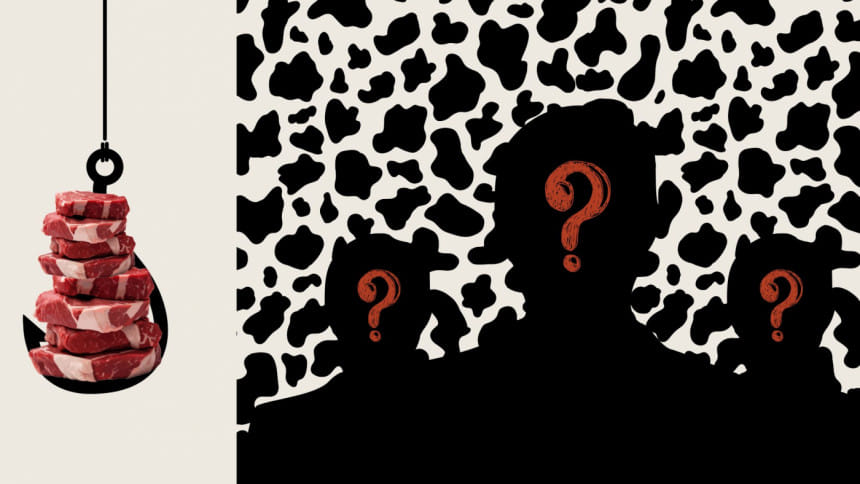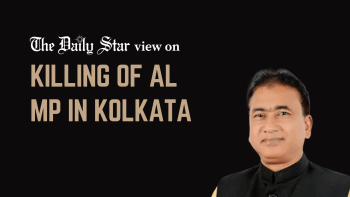A monologue on the beasts among us

The butcher cuts the meat into pieces. It's hard to believe that the hide was concealing so much. Each organ of the animal has its own story, but now it's all history. Just the day before Eid, we bought the animal from a makeshift cattle market. There was visible dissatisfaction everywhere. The traders complained they were not receiving the prices displayed by the online markets, while the buyers believed the traders had entered the market with unrealistic expectations curated by some corporate manipulators. The farmers who fattened their animals realised that most of their customers' wallets were far from fat.
As I stand before the heap of fresh meat, my thoughts turn to the slain politician who was hacked to death, and his body was disposed of like trash. When MP Anar went missing, I cried with his family. His daughter's appeal to find her missing father moved me. I thought he was a simple man who crossed the border in a rickshaw van. Then the truth started coming out of the hide, piece by piece.
The MP turned out to be someone with a notorious past: underground politics, gold smuggling, and racketeering. It was hard to imagine that the face could hide so many secrets. Information came to light byte by byte. The sympathy for the public figure waned, yet his brutal end served as a reminder that, in the end, we live in a jungle where beasts will devour beasts. Once the skins of civilisation peel off, the inner beasts are revealed. Once exposed, the animal becomes a target. The hunter is hunted. You can only pray that you don't become prey.
The pile of meat starts getting bigger and bigger under the blades of our hired butcher. I am manning the mission so that beefs don't get mixed up, pieces don't get missing during the process, and the size of meats remains appropriate for distribution. The animal we bought the day before probably had no clue about our purpose. Even if it did, it was helpless. It followed us, meeting its fate rather naively. Again, I think of the slain parliamentarian. I could have thought of Jamal Khashoggi, but Anar is nearer. They used the same technique, luring Anar into the trap only to hack him into unidentifiable and disposable pieces. Is it true that they marinated Anar's meat with spices to mask the corpse smell? I suddenly lose my appetite, and the meat looks gross despite its holy nuances.
The political animals are full of tricks. They know how to bring other animals into their traps. At times, lust taints the baits, painting them with desire. We hear that the predators lured Anar into a honey trap. The bait unleashed the inner beast within the man who met his demise. Other beasts were waiting to match him.
The baits come in different shapes and sizes. Animal traders know which bait to hook their prey with. Some baits are glorified by focusing on size. The bigger the animal, the larger the display. The spectators wait for the animals' dramatic fall, with resounding thumps that will echo through heaven's doors to announce the sacrifice. Private prayers become public. Instead of sacrificing their inner beasts, some animals prefer displaying their bestial energy when sobriety is required. Some fall for the honeyed words of the traders who have corporatised the trade.
They reimagine Darwinian selectionism—the principle of survival of the fittest. Being fit, on the other hand, entails being intelligent enough to be adaptive. The strongest of animals have disappeared, while we humans have survived, not because we were the strongest, but because we were quick learners. The small can only eat the big if you know how to process it. The animals who are having a field day may very well be devoured by us, the humans. The day may come when our skins will peel off, and we will match the bestiality of other animals.
After all, we are all animals, whether political or biological. Some animals are bigger than others. Some are smarter and more adaptive. Some eat while others are eaten. Someone who drags an animal with a rope may soon find themselves roped in. The one who sharpens the blade can soon be under its edge.
The individuals who fatten their beasts manipulate the egos of their intended victims. They are aware that certain animals are susceptible to being deceived by appearances. Then there are corporate masters who understand the power of images. They import rare breeds to stand out from the crowd. To maximise their profits, they hide import documents. They claim their items are exotic, albeit esoteric. To make claims for their goods, they invent family lineages. Little do they realise that once the meats are processed, it's all the same. The hide will remain on the pavement without any offer. Another syndicate. They'll make you wait so that you can give it away for free.
In the market of sacrifice, it is difficult to distinguish between devotion and devotee. Who sacrifices whom? For whom do the sacrifices take place? When did God require projected pride manifested by the size of the beasts, as opposed to humility and submission? Who buys these animals? Does God sanction the purchase of a holy sacrifice with unholy money? Who uploaded the images with the intention of manipulating the public's perception? The unreal cost of an animal piques the public's interest. The boasting beasts come under scrutiny. The hidden animals get exposed. The father disowns his son—or should I say sacrifice? The analogy becomes a false echo of the original sacrifice. The fallen animal proves to be less intelligent and less adaptive. Darwin wins. Does their former master's sacrifice of the mighty ones reflect God's will? Or is it the will of the political master? Was Anar sacrificed, too? The list of fallen heroes and runaway animals is growing.
The heap starts getting bigger and bigger. The creature has long come out of its hide. It will be consumed. Its energy will be dispersed. The yields will be bagged. The yields will be eaten. The meat will undergo a transformation into various forms of energy. It will reach the bloodstream. It will travel to various cells at different ends. The beast will be reborn.
Everything must come to an end. But who will have the last piece? Who will have the last laugh? Are the fallen false gods and the reign of animals a test of God's will? Pray we don't become prey.
Dr Shamsad Mortuza is professor of English at Dhaka University.
Views expressed in this article are the author's own.
Follow The Daily Star Opinion on Facebook for the latest opinions, commentaries and analyses by experts and professionals. To contribute your article or letter to The Daily Star Opinion, see our guidelines for submission.

 For all latest news, follow The Daily Star's Google News channel.
For all latest news, follow The Daily Star's Google News channel. 










Comments